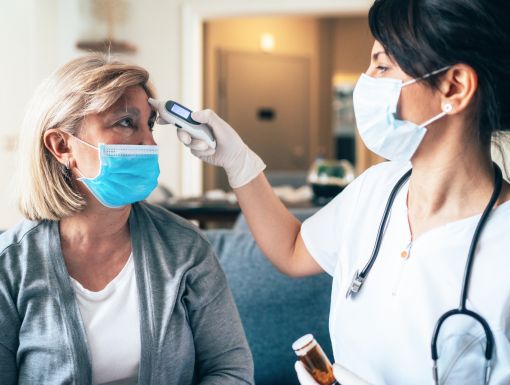
Recovering from COVID-19: CDC Issues New Isolation Guidelines for 2024
If you suspect you have COVID-19, you may wonder how long the illness will last. While sick, what precautions should you be taking? How long is isolation necessary? When can you return to work and “normal” life?
The Centers for Disease Control has issued new COVID isolation guidelines for 2024: People who test positive no longer need to isolate for five days. The recommendations suggest returning to normal activities once symptoms are improving overall for at least 24 hours, and if a fever was present, it has been gone without use of a fever-reducing medication.
The CDC says it issued the updates because the United States is seeing far fewer hospitalizations and deaths associated with COVID-19 and because we have more tools than ever to combat flu, COVID and RSV.
In addition, the CDC recommends adults age 65 and up receive an additional 2023-2024 COVID vaccine as a booster. The CDC is making the recommendation because older adults are at a higher risk of severe illness from COVID-19.
COVID vaccines for adults are available at Ochsner Pharmacy and Wellness Retail Pharmacies without an appointment as a walk-up vaccine. Pediatric COVID vaccines are available through participating Ochsner Pediatric clinics. Find an Ochsner pharmacy location near you.
If you’re experiencing mild COVID symptoms, you should expect the recovery process to be similar to other respiratory viral infections, like the flu. If you’re recovering from a moderate case of COVID-19, you’ll likely experience prolonged fatigue, coughing and shortness of breath. These can often last for several weeks.
If you’re experiencing a severe case of COVID-19, it can take several weeks to months to recover.
Preventing spread of COVID and other respiratory diseases
Although the CDC changed the COVID isolation guidelines, the CDC still recommends the following guidance regarding wearing masks and other methods of preventing the spread of respiratory diseases:
- Wear a mask when you are home sick to protect others in your home.
- Bring as much fresh air into your home as possible by opening doors and windows or using an exhaust fan. Use a portable high-efficiency particulate air (HEPA) cleaner.
- Cover your mouth and nose with a tissue when you sneeze. Throw the tissue away immediately. If you do not have a tissue, sneeze into your elbow, not your hands.
- Wash your hands with soap and water for at least seconds before, during and after preparing food; before and after eating food; before and after caring for someone who is sick; before and after treating a cut or wound; after using the toilet; after changing a diaper; after blowing your nose, coughing or sneezing; after touching garbage; and after touching an animal or animal food.
- Clean frequently touched surfaces, such as countertops, handles, doorknobs and handrails.
- Stay home from work when you are sick.
At-home treatment
Most people who become sick with COVID-19 will experience mild illness and can recover at home. The symptoms usually last a few days, and most feel better within a week. It’s important to get plenty of rest, drink lots of fluids and take pain relievers as needed. Always follow your doctor’s recommendations about your care.
Emergency warning signs
It’s important to monitor yourself or your loved one for worsening symptoms. If they appear to be getting worse, call your doctor. Call 911 if the sick person can’t be woken up or you notice any emergency signs, including:
- Trouble breathing
- Persistent chest pain or pressure
- New confusion
- Bluish lips or face
- Inability to stay awake
Find an Ochsner pharmacy location near you.

